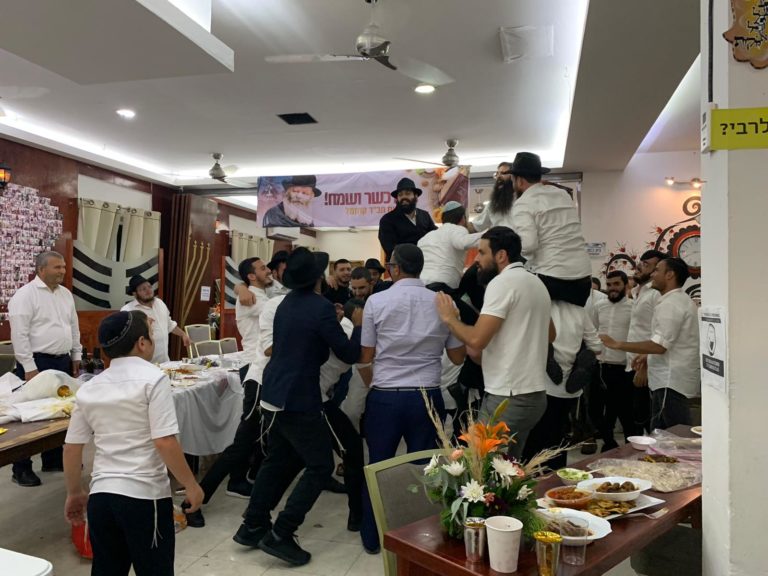
Editor’s Note: This is part 3 of a three part series. Read part one here and part two here.
The wait staff rushed to the circuit box on the back wall, quickly looking for the right breaker to pull. Meanwhile the dancers reached a new fever pitch in the dining hall, they were now trying desperately to reach the heavens via the shoulders of their fellow participants.
Up and down they went in a rhythmic fashion… getting closer and closer to the fans spinning above.
The wait staff rushed to the circuit box on the back wall, quickly looking for the right breaker to pull. Meanwhile the dancers reached a new fever pitch in the dining hall. Passover rum diary part 3. https://t.co/i0g1r5Vcj3 pic.twitter.com/SkFfm4GVcH
— Johnny “I got my 💉” Kunza (@johnkunza) April 15, 2021
Finally the fans slowed down. The dancing picked up.
There’s a certain instinctual gracefulness to holding a baby at a crowded table surrounded by dozens of increasingly intoxicated men.
In a way you’re performing your own private dance on the edge of a large crowd. Just you and the little guy swaying with each bump and thump of the chair. You concerned more than he is about the jostling and the increasing fervor of those around you.
In some traditions, specifically Chabad, the last day of Passover is reserved for one more gathering. Here's part 3 of my Passover rum diary: The Moshiac seudah. https://t.co/i0g1r5Vcj3 pic.twitter.com/aIzpQW4Br4
— Johnny “I got my 💉” Kunza (@johnkunza) April 15, 2021
You’re also at a big disadvantage. You would think holding a baby would garner you the better scraps of food, or at least some help at obtaining them, but no. At least I had one hand free for my cup of wine.
This was my introduction to the Moshiac seudah.
In some traditions, specifically Chabad, the last day of Passover is reserved for one more gathering. I’ll let Chabad.org explain it:
The last day of Pesach is celebrated by eating a special, festive banquet called Moshiach’s seudah, a custom initiated by the Baal Shem Tov. The connection between the last day of Pesach and Moshiach is explained by the Tzemach Tzedek: “The last day of Pesach is the conclusion of that which began on the first night of Pesach. The first night of Pesach is our festival commemorating our redemption from Egypt by the Holy One, Blessed be He. It was the first redemption, carried out through Moshe Rabbeinu, who was the first redeemer; it was the beginning. The last day of Pesach is our festival commemorating the final redemption, when the Holy One, Blessed be He, will redeem us from the last exile through our righteous Moshiach, who is the final redeemer. The first day of Pesach is Moshe Rabbeinu’s festival; the last day of Pesach is Moshiach’s festival.”
I was no longer in Isla Mujares. I was now in Cozumel, a larger island off the coast of Playa del Carmen. Here the Jewish community is large enough to support two synagogues and at least 3 kosher restaurants (there’s a debate over what happened to the fourth).
Mostly Israelis and Americans, the full timers here are all about business. What they do is better left to the imagination but there’s a hustle going on. There’s a pulse here that’s different from the laid back “whateverness” vibe of Isla.
“These guys are way too commercial,” one of my companions (a shaliach in the United States) bemoaned one day over dinner. We were eating in “Jerusalem,” the kosher restaurant attached to the Chabad House.
There were way more people here than there were at Isla. Everyone, including what felt like half of my Crown Heights neighborhood, seemed to have descended upon Cozumel for Second Days.
“Did I just hear Chana?”
Yes. Yes you did.
The young rabbi was busy. He just had a daughter, like just had a baby a few days ago. On top of this he had the Chabad House to run and a Passover program at a neighboring hotel. Before the seudah I spotted him marching the wrong way, out of town smiling and waving as I continued in the opposite (and right) direction. I chalked it up to that Cozumel hustle.
Loud and chaotic. Those would be the two words I would use to describe the following scene.
Dozens and dozens of Jews sitting at a table stretching down the length of a long room. On one side of the room there was the rabbi, bochurim and what I assumed to be special donors and residents. Very male.
On the other side, mixed visitors from all over. Me in the middle… sitting at the dividing line between the two groups holding a baby (the same baby that magically appeared in Isla Mujares). I was my own personal mechitza watching the two sides like someone watching a tennis match.
The room filled up and extra rows of chairs were placed behind the people sitting at the table. The rabbi’s half of the room was already drinking and singing. Singing loudly.
The rabbi got up and tried to silence the crowd.
A group of young women near me booed and started shouting something in Hebrew. (It did not sound polite, hand gestures included).
It was time for the bochurim to give their speeches. Poor guys never had a chance. The other half of the room just wasn’t up to the task of listening.
Enter the chaos. The rabbi’s half of the room realizing that the visiting half was hopelessly lost circled their ranks and listened taking breaks to randomly sing, dance and cheer.
After 3 or 4 talkers the rabbi got up again.
“Hey shut up!” someone shouted.
Eventually the room got as quiet as it was going to in that moment. A dull hum of dozens of private conversations still taking place.
“You guys we have a very special person to say something,” the rabbi shouted.
“QUIET!”
“SHHHHHHHHHH.”
I missed who the special person was, but an older man got up to speak.
The first part of what he said got lost in the hum, but then the crowd’s volume dropped a few more octaves.
“Enough with being divided Jew against Jew,” the man shouted to nods of the bochurim surrounding him.
“We were all Jews when we walked through the Red Sea together,” he continued.
Cheers and applause ensued. If he had more to his speech it wasn’t going to be said tonight, at least not to this crowd.
Yes it was chaos, but there was also a good message to take from the night. “Enough with being divided Jew against Jew,” the man shouted to nods of the bochurim surrounding him. “We were all Jews when we walked through the Red Sea together,” he continued. https://t.co/i0g1r5Vcj3 pic.twitter.com/JvQ6OdAJDH
— Johnny “I got my 💉” Kunza (@johnkunza) April 15, 2021
The rest of the night was a bit of a blur. Table dancing. More singing. Many more animated conversations. More food.
“You’re the only Jew in the world eating matzah right now,” someone shouted at me later in the evening.
My mouth was still on fire from the jalapenos in one of the dips and the matzah was the only thing available to bring the temperature down.
It was well past sundown at this point and we had a mimouna party to go to (hosted at one of the compounds here on the island).
“Enough with being divided Jew against Jew,” the speaker’s words kept circling in my head.
Even here in the Caribbean on an island the current situation of the world caught up with us. We are all travelers and on top of yearning for something new, we are also escaping something. For me it was quite simple, I didn’t want to have a Passover like the one I had last year huddled in an apartment in the middle of a pandemic not knowing what the future was going to look like.
But we couldn’t escape the fact that deep down we know something isn’t right with the world today. The way that we talk to each other and interact just isn’t cutting it.
“Enough with being divided Jew against Jew.”
Here in Mexico there were Jews of every stripe, tradition, religiosity celebrating the miracle of the Exodus story.
“We were all Jews when we walked through the Red Sea together.”
Observing the scene around me I felt more connected to that part of the story than I ever had. As rowdy as that crowd was. As opinionated as that crowd was. We were all in the same place and in the same situation. And I feel strongly that we all would have all joined hands together to walk through the parted sea because that’s what Jews do. We may be a loud bunch when we get together, but we also stick together.
They say on the last day of Passover you get extra blessings. My hope is that we can continue that same spirit of togetherness throughout the rest of the year. We are supposed to be different and we are supposed to disagree. But, perhaps we can be just a little less divided.
Originally Published Apr 15, 2021 12:14AM EDT
